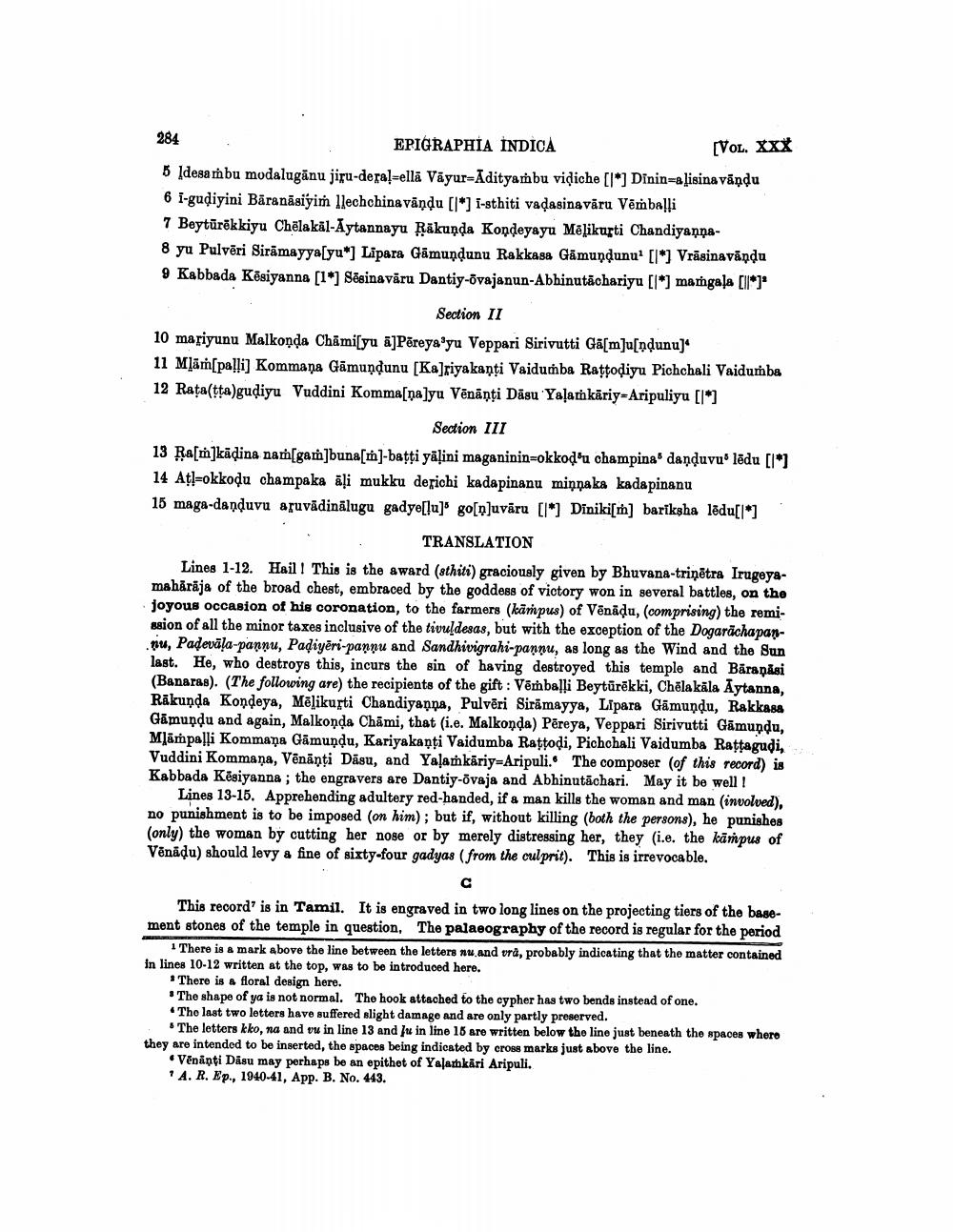________________
284 EPIGRAPHÍA INDICA
[Vol. XXX 5 ]desambu modalugānu jiru-deral=ellä Väyur=Adityambu viņiche [l*] Dinin=alisina vāņdu 6 i-gudiyini Bāranāsiyim llechchina vāņdu [l*] i-sthiti vadasingvāru Vēņballi 7 Beytūrēkkiyu Chēlakal-Aytannayu Räkaņda Kondeyayu Mējikurti Chandiyanna8 yu Pulvēri Sirāmayya[yu*) Lipara Gāmundunu Rakkasa Gāmundunu' [l*) Vrāsinavāņdu 9 Kabbada Kēsiyanna [1] Sēginavāru Dantiy-övajanun-Abhinutāchariyu [l*) mangala [11*]*
Section II 10 mariyunu Malkonda Chāmisyu ā]Pēreya'yu Veppari Sirivutti Gä[m]u[ndunu)“ 11 Mlām[palli] Kommaņa Gāmundunu [Ka]riyakanti Vaidumba Raţtodiyu Pichchali Vaidumba 12 Rata(tta)gudiyu Vuddini Komma[na]yu Vēnāņti Däsu Yaļamkāriy=Aripuliyu [l*]
Section III 13 Ka[m]kādina nam[gam]buna[1]-bațţi yäļini maganinin=okkodu champina' daņquvu' lēdu [l*] 14 Atl-okkodu champaka āļi mukku derichi kadapinanu miņņaka kadapinanu 15 maga-danduvu apuvādinālugu gadye[!u]go[n]uvāru [I*] Diniki[m] bariksha ledu[1] .
TRANSLATION Lines 1-12. Hail! This is the award (sthiti) graciously given by Bhuvana-triņētra Irugeyamahårāja of the broad chest, embraced by the goddess of victory won in several battles, on the joyous occasion of his coronation, to the farmers (kārpus) of Vēnādu, (comprising) the remiasion of all the minor taxes inclusive of the tivuldesas, but with the exception of the Dogarāchapanpu, Padevāla-pannu, Padiyeri-pannu and Sandhivigrahi-pannu, as long as the Wind and the Sun last. He, who destroys this, incurs the sin of having destroyed this temple and Bäranäsi (Banaras). (The following are) the recipients of the gift : Vēmballi Beytūrēkki, Chēla kāla Aytanna, Rākunda Kondeya, Mēlikurti Chandiyanna, Pulvēri Sirāmayya, Lipars Gāmundu, Rakkasa Gāmundu and again, Malkonda Chāmi, that (i.e. Malkonda) Pēreya, Veppari Sirivutti Gāmundu, Mlämpalli Kommana Gāmundu, Kariyakanti Vaidumba Rattodi, Pichohali Vaidumba Rattagudi, Vuddini Kommaņa, Vēnāņti Dāsu, and Yaļamkāriy-Aripuli. The composer (of this record) is Kabbada Kēsiyanna ; the engravers are Dantiy-ovaja and Abhinutāchari. May it be well!
Lines 13-15. Apprehending adultery red-handed, if & man kills the woman and man involved), no punishment is to be imposed (on him); but if, without killing (both the persons), he punishes (only) the woman by cutting her nose or by merely distressing her, they (i.e. the kāmpus of Vēnāļu) should levy a fine of sixty-four gadyas (from the culprit). This is irrevocable.
This record' is in Tamil. It is engraved in two long lines on the projecting tiers of the basement stones of the temple in question, The palaeography of the record is regular for the period
1 There is & mark above the line between the letters nu.and vrd, probably indicating that the matter contained in lines 10-12 written at the top, was to be introduced here.
* There is a floral design here. * The shape of ya is not normal. The hook attached to the cypher has two bends instead of one. • The last two letters have suffered slight damage and are only partly preserved.
* The letters kko, na and vu in line 13 and ju in line 16 are written below the line just beneath the spaces where they are intended to be inserted, the spaces being indicated by cross marks just above the line.
• Venanti Däsu may perhaps be an epithet of Yalamkāri Aripuli. * A. R. Ep., 1940-41, App. B. No. 443.




